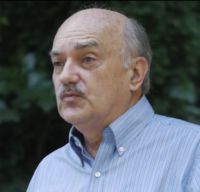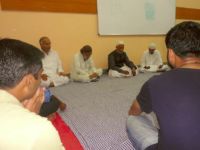Plurality Is At the Heart of Life
Vidyajyoti College of Theology conducted a two day national seminar on “Witnessing to the Gospel in a polarised India” on 16-17 February 2015. Two Jesuit sociologists: Prof. Rudolf Heredia and Prof. Ambrose Pinto made brilliant presentations on Religious Freedom: The Constitutional Debate and the Law Today and The Challenges of Minorities Christians and Dalits in India in the Present Context of Hindutva respectively. A well known Indian theologian Prof. Jacob Parapally MSFS made an excellent presentation on Witnessing to the Gospel: Gift and Task in the Present Day India.
A noted writer and historian from Jamia Millia Islamia, Prof. Mukul Kesavan presented made an incisive analysis on the cultural nationalism of the BJP government under a title: Nationalism at Crossroads: The Struggle for Political ‘Commonsense’. It was truly an intellectual and contextual theological exercise. Prof. Kesavan drawing from history demonstrated that nationalism that respects diversity will suit our nation and nationalism that does not respect diversity of our nation will be divisive.
Unity in Diversity and Diversity in Unity
India is immensely diverse in every aspect of life. The snow clad mountains, dancing seas, thick forests, fertile fields, and hot deserts decorate her landscape. Peoples of this nation speak numerous languages. Their cultures are varied. They follow different religious traditions. They dress themselves in varied fashions. Their taste buds differ from one another. Their literary, cultural and political histories are so varied. Thus, ours is rightly called the subcontinent! The diversity enriches us. In this diversity we affirm our unity and in our unity we recognise diversity. Our unity as peoples of India derives its strength and nourishment from such diversity. From this diversity arise a shared sense of oneness and a deeply mystical experience of union as fellow citizens. A common identity (political identity) as Indians comes NOT from a particular dominant culture BUT from a shared sense of oneness that is rooted in diversity. This unity in diversity and diversity in unity is the bed rock of our Indian Nationalism.
Homogenization Does Not Fit the Sub-Continent
Prof. Mukul Kesavan in his paper at the seminar insisted that the leaders of our freedom struggle invoked this shared-sense-of-oneness and shaped and moulded a Nationalism that tried to represent different shades of beliefs, perspectives, ideals, standpoints, positions, visions, opinions, viewpoints, values, outlooks, attitudes, ideas and ways of life of Indians. They were learning the effective way of representing diversity in the pluralistic subcontinent. The Indian National Congress that steered freedom struggle in a way embraced diversity and claimed to represent or to speak for India. The leaders adopted a self-conscious pluralism. We come from diverse background and within our membership we represent diversity. So we claim our right to speak for all Indians. They represented their grievances in a non-denominational way. They did not invoke the idea of uniformity, he emphasized. They did not assume a syncretic uniformity … where cultures merge and give rise to one Indian Culture! It would be simply an illusion. They knew that such homogenization does not fit the sub-continent.
Homogeneity Leads To Majoritarianism
Prof. Kesavan contrasted this diversity inspired nationalism with another type of Nationalism that was in circulation in the West. The Romantic Nationalism! The European nationalism is rooted in a shared culture, language, or religion. This nationalism is rooted in homogeneity. Many Right Wing Hindu groups, like Jan Sangh, RSS draw inspiration from such nationalism. They invoke homogeneity. They base themselves on one particular religious identity. Hindi – Hindu- Hindustan! Such forced homogeneity leads to majoritarianism, Prof Kesavan argued. Such homogeneity neglects diversity and obfuscates Nationalism with majoritarianism. Such majoritarianism creates first class and second class citizens. One dominant community corners powers for oneself with a powerful political rhetoric. It is obvious that RSS and their ideological associates hold on to such truncated vision and forcing this upon a diverse nation, Prof. Kesavan maintained.
Nationalism Opened To Emerging Aspirations of Many Subaltern Groups
His presentation brilliantly portrayed the struggle for preserving and protecting diversity and secular space in present day India. As a student of interfaith relations in this diverse nation, I think it is important to flag three important concerns connected with the issue. One, the national leaders of freedom struggle prudently emphasised diversity and build a movement against the British. Their idea of nationalism needs to be fine tuned to present times. Whatever be its advantage it is certainly a sort of elite leaders with mass base. Today this Nationalism should be opened to emerging aspirations of many subaltern groups; Dalits, Adivasis, socially disadvantaged groups, and minorities. The emerging young Indians from every socio-cultural-religious groups want a New and developed India, Corruption Mukth (free) India. An India for all: not for particular section of people or only for Corporates. This needs leaders with imagination and integrity. Mr Arvind Kejariwal has shown such imagination and integrity. It certainly looks like spring time in Delhi politics? We need more leaders of calibre and truthfulness.
Human Rights as a Common Ground for All Secular Forces
Two, we need to take this a step further. The socially disadvantaged, marginalised groups, Dalits, Adivasis and major sections of minorities continue to remain at the peripheries. Their situation has worsened in the first decade of this new century. They are often victims of lopsided development. They cannot be sacrificed on the altar of development. Any development discourse thus should include their rights and aspirations. The Nationalism that emphasises diversity should make human rights as a common ground for all secular forces to interact and work with. I would like to emphasise that the nationalism that respects diversity should build its secular edifice on the foundation of Human Rights.
Plurality … The Very Design of God
Three, as Christian students of theology we recognise that this diversity/plurality is part of the very design of God and mystery of God. Diversity within nature invites us to recognise ‘interdependence’ of that exits. The nature works interdependently. Water, soil, Carbon-di-oxide, and sunlight make a joint venture with plants to bring about fruits. Symbolically nature brings forth fruits through a collaborative course of action. In the human world too, when many people from varied backgrounds put their hearts and minds together, they make a contribution to a new and better world. Diversity teaches us that we are interdependent and we are called to work together to build a better world. Working together we seek unity in diversity not in uniformity.



Leave A Comment
You must be logged in to post a comment.